Discipline Letter To Parents
[Your Name]
[Your Position/Title]
[School/Organization Name]
[Date]
Dear [Parent/Guardian's Name],
I hope this letter finds you well. I am writing to discuss a matter of utmost importance regarding your child, [Student's Name], who is currently enrolled in [Grade/Class] at [School/Organization Name]. It is necessary for me to bring to your attention an incident that has occurred, which has prompted the need for disciplinary action.
On [Date], during [time/place/activity], [Student's Name] engaged in behavior that violated the established rules and regulations of our school/organization. The details of the incident are as follows: [Provide a clear and objective account of what transpired, including relevant dates, times, locations, and any witnesses or evidence if available].
This type of behavior is not in line with the values we strive to instill in our students, and it has a negative impact on both the individual involved and the broader school/organization community. Our primary goal is to create a safe and conducive learning environment for all students, and such behavior cannot be tolerated.
In response to this incident, we have taken the following disciplinary measures: [Specify the disciplinary action that has been taken, such as detention, suspension, counseling, or any other appropriate action]. We believe that these measures will help [Student's Name] understand the seriousness of their actions and encourage them to make better choices in the future.
However, we strongly believe that a collaborative effort between the school/organization and parents/guardians is essential in addressing and rectifying such behavior. We kindly request your full cooperation and support in addressing this matter at home. It would be beneficial for you to discuss this incident with [Student's Name] and reinforce the importance of respecting rules, guidelines, and the rights of others.
We also encourage you to schedule a meeting with me or any relevant school/organization staff member to discuss the incident further. This will provide an opportunity for us to share any additional information, answer any questions you may have, and work together to ensure that [Student's Name] receives the guidance and support needed to learn from this experience.
Please be assured that our primary objective is the well-being and growth of your child. We are committed to providing them with the necessary tools and guidance to become responsible individuals. By working together, we can help [Student's Name] navigate through this challenging time and foster their personal and academic development.
Thank you for your attention to this matter. If you have any questions or concerns, please do not hesitate to contact me at [Contact Information]. We appreciate your cooperation and support in maintaining a positive and respectful learning environment for all students.
Sincerely,
[Your Name]
[Your Position/Title]
[School/Organization Name]
Discipline Letter for Minor Classroom Misbehavior
Subject: Notice of Classroom Misbehavior
Dear Parents,
I am writing to inform you about some minor behavioral issues observed in your child during class this week. While your child participates actively, there have been instances of talking out of turn and minor distractions affecting the learning environment.
We request your support in discussing appropriate classroom behavior with your child to help maintain a productive and respectful atmosphere. We appreciate your cooperation and look forward to working together to guide your child positively.
Sincerely,
[Teacher's Name]
[School Name]
Serious Discipline Letter Regarding Repeated Misconduct
Subject: Concern Regarding Repeated Misbehavior
Dear Parents,
It has come to our attention that your child has repeatedly violated school rules over the past month, including disrupting classes and showing disrespect towards staff and peers. Despite prior verbal warnings, these behaviors continue.
We urge you to meet with us to discuss a joint approach to addressing these concerns and ensuring your child understands the seriousness of their actions. Continued misconduct may result in further disciplinary measures.
Thank you for your prompt attention to this matter.
Sincerely,
[Principal's Name]
[School Name]
Informal Email About Minor Behavioral Concern
Subject: Quick Note About Today's Class
Hi [Parent's Name],
I wanted to touch base regarding your child’s behavior in class today. They were slightly off-task during activities, but nothing too serious. Just wanted to keep you in the loop so we can help them stay focused together.
Thanks for your support!
Best,
[Teacher's Name]
Heartfelt Letter Addressing Bullying Incident
Subject: Immediate Attention Required Regarding Bullying
Dear Parents,
It has been reported that your child has been involved in bullying behavior towards peers. This behavior is concerning and goes against the values of respect and empathy we uphold at our school.
We request a meeting with you at the earliest convenience to discuss ways to support your child in understanding the impact of their actions and preventing future incidents. We are committed to working with your family to ensure a safe environment for all students.
Sincerely,
[Counselor/Principal Name]
[School Name]
Provisional Warning Letter for Academic Negligence
Subject: Provisional Warning Regarding Academic Conduct
Dear Parents,
We have noticed that your child has been neglecting assignments and deadlines, which may affect their academic performance. This letter serves as a provisional warning to bring attention to this matter.
Please encourage your child to complete pending tasks promptly. We are available to discuss strategies and support to help improve their academic engagement.
Sincerely,
[Teacher's Name]
[School Name]
Quick Message About Classroom Disturbances
Subject: Classroom Behavior Update
Hello [Parent's Name],
Just a quick note to let you know that your child was talking during lessons today. Please remind them to stay focused in class. Thanks for your support!
Regards,
[Teacher's Name]
Formal Letter Requesting Parent-Teacher Meeting
Subject: Invitation for Parent-Teacher Meeting
Dear Parents,
Due to ongoing concerns regarding your child’s behavior in school, we would like to invite you to a meeting to discuss these issues in detail. The purpose of the meeting is to collaboratively develop a plan to support your child in improving conduct and achieving success.
Please contact the school office to schedule a convenient time. We value your cooperation and partnership in your child’s education.
Sincerely,
[Principal's Name]
[School Name]
Funny/Lighthearted Note About Minor Mischief
Subject: Your Child’s Playful Adventures in Class
Dear [Parent's Name],
Your child certainly brings energy to class! Today’s antics involved some playful mischief that made everyone smile but slightly disrupted the lesson. While we appreciate their creativity, a gentle reminder at home would help maintain focus.
Looking forward to seeing their energy channeled positively!
Warm regards,
[Teacher's Name]
What / Why: Understanding Discipline Letters to Parents
A Discipline Letter to Parents is a formal or informal communication from a teacher or school administration to a child’s parents regarding behavioral or academic concerns. Its purpose includes:
- Informing parents of observed misconduct or concerning behavior.
- Requesting parental support in correcting or guiding the child.
- Documenting incidents officially for school records.
- Providing a basis for further disciplinary action if necessary.
Who: Who Should Send a Discipline Letter
- Classroom teachers for minor behavioral issues.
- School counselors for emotional or social concerns.
- Principals or administrators for serious or repeated misconduct.
- Academic coordinators for issues related to assignments or studies.
Whom: Who Receives the Letter
- Parents or legal guardians of the student.
- In some cases, secondary recipients may include:
- School counselor for follow-up.
- Department head or principal for record-keeping.
- Student themselves in copy for awareness (optional).
When: Situations That Trigger a Discipline Letter
- Minor classroom disruptions (talking, inattentiveness).
- Repeated rule violations or disrespect towards staff.
- Bullying or aggressive behavior toward peers.
- Academic negligence (missed homework or tests).
- Vandalism or damage to school property.
- Participation in prohibited activities (fighting, cheating).
How: Writing and Sending a Discipline Letter
- Observe and document the behavior accurately.
- Choose the tone: formal, informal, serious, or lighthearted.
- Start with a clear subject and greeting.
- Describe the behavior factually and objectively.
- Suggest actions or request a meeting if needed.
- Proofread for clarity and professional language.
- Send via appropriate mode (email for quick updates, printed letter for formal notice).
Requirements and Prerequisites
- Accurate record of the incident(s) and dates.
- Knowledge of school policies and rules regarding the behavior.
- Awareness of the student’s history and previous interventions.
- Preparedness to suggest corrective actions or meetings.
- Contact information for parents/guardians.
Formatting: Best Practices for Discipline Letters
- Keep letters concise but detailed enough to communicate the issue.
- Tone should match severity: formal/serious for repeated misconduct, informal for minor issues.
- Use clear, professional language; avoid emotional or accusatory wording.
- Letters should include:
- Subject line
- Salutation
- Description of behavior
- Requested action or meeting
- Closing and signature
- Use paragraphs to separate points; avoid long blocks of text.
After Sending / Follow-up
- Confirm receipt of the letter via email, call, or acknowledgment.
- Schedule meetings if requested.
- Monitor the student’s behavior for improvement.
- Keep records of responses and any corrective measures implemented.
Pros and Cons of Sending Discipline Letters
Pros:
- Formal documentation of incidents.
- Engages parents in child’s behavior management.
- Encourages accountability in students.
Cons:
- May cause tension if perceived as overly critical.
- Could lead to defensiveness from parents.
- Requires careful wording to avoid miscommunication.
Tricks and Tips for Effective Discipline Letters
- Keep a factual log of incidents to support the letter.
- Match tone to severity to prevent unnecessary alarm.
- Include suggestions for parental support or solutions.
- Use bullet points for multiple issues to improve readability.
- Maintain professionalism even in humorous or lighthearted letters.
Mistakes to Avoid
- Using accusatory or inflammatory language.
- Sending letters without prior documentation or observation.
- Overgeneralizing behavior instead of citing specific incidents.
- Ignoring cultural or parental sensitivities.
- Failing to suggest next steps or solutions.
Elements and Structure of a Discipline Letter
- Subject line clearly indicating purpose.
- Salutation addressing the parent/guardian.
- Detailed description of incident(s).
- Reference to prior warnings if applicable.
- Suggested corrective action or request for meeting.
- Closing statement encouraging cooperation.
- Signature of the sender with designation.
- Attachments (optional) like behavior logs or reports.
Does it Require Attestation or Authorization?
- Typically, teacher-sent letters do not require attestation.
- Formal letters from administration may need:
- Principal’s signature
- School seal or official letterhead
- Email notifications may include a digital acknowledgment request.

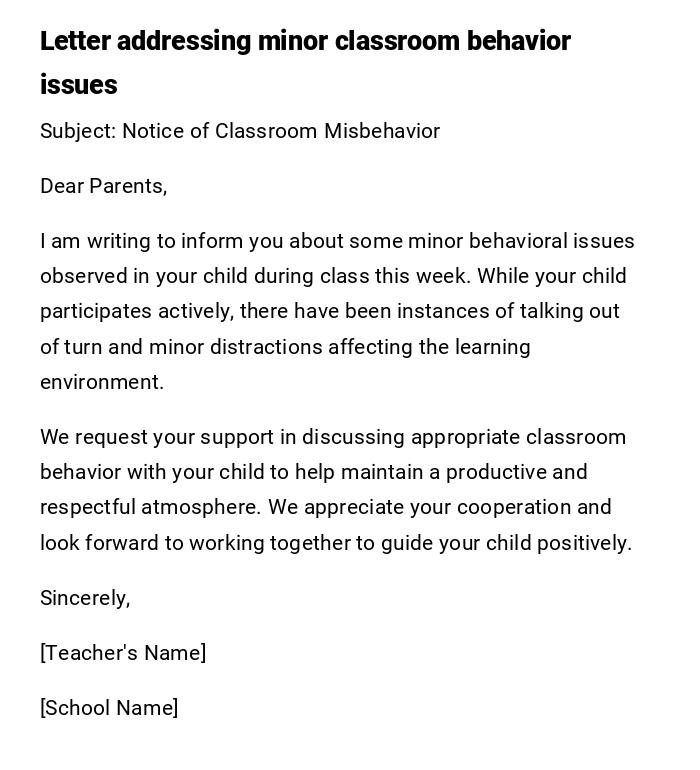
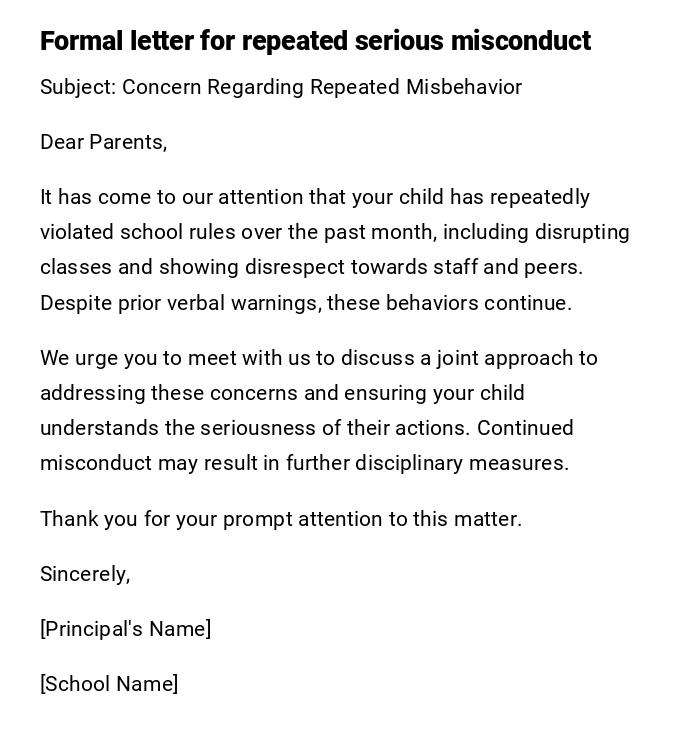
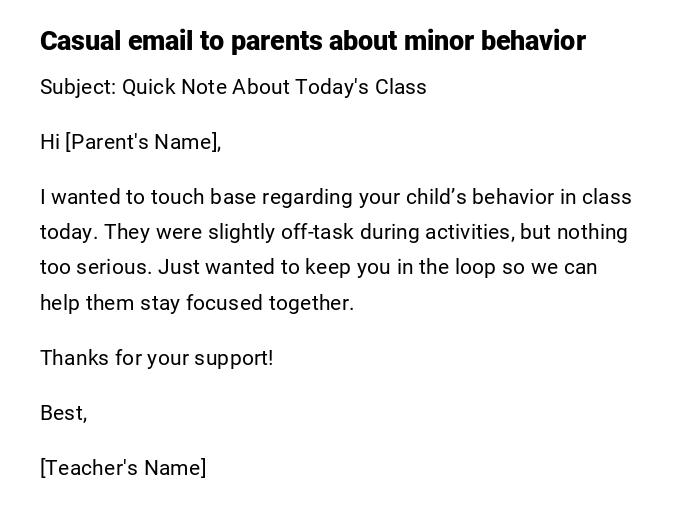
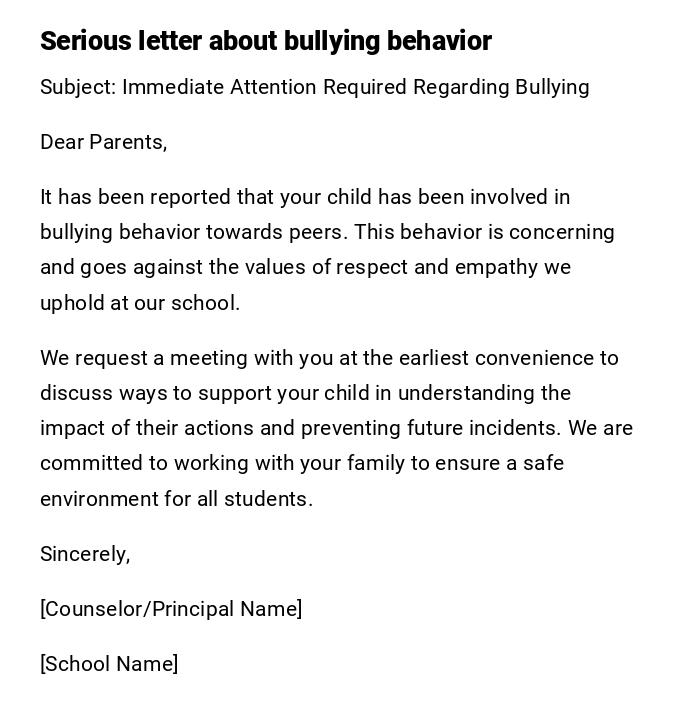
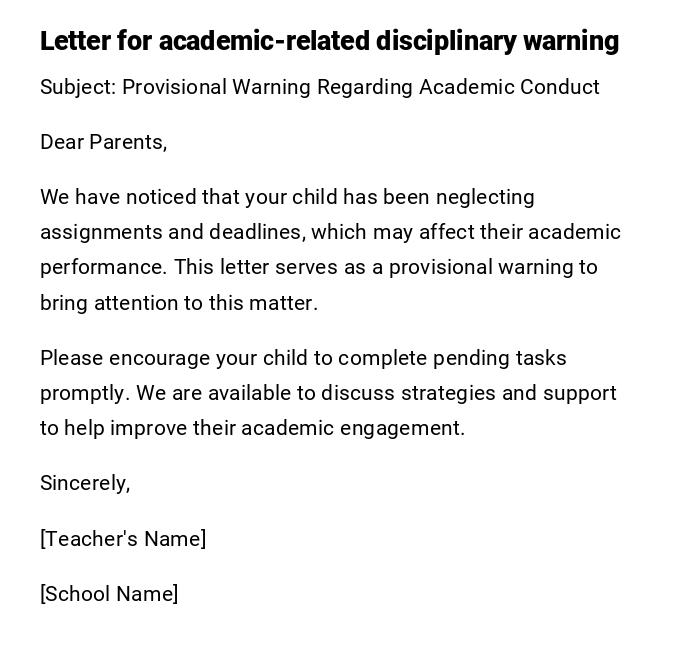
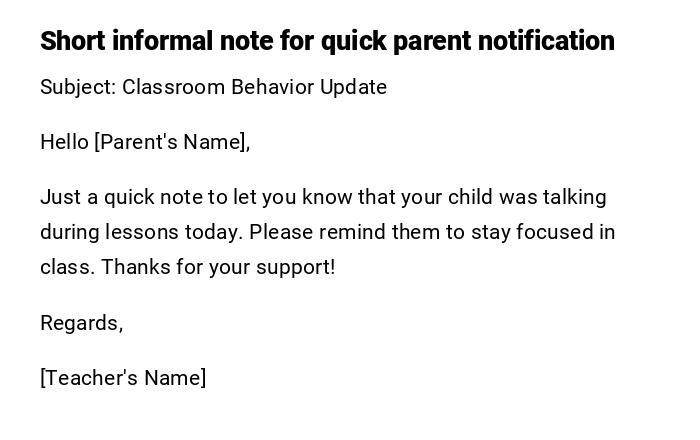
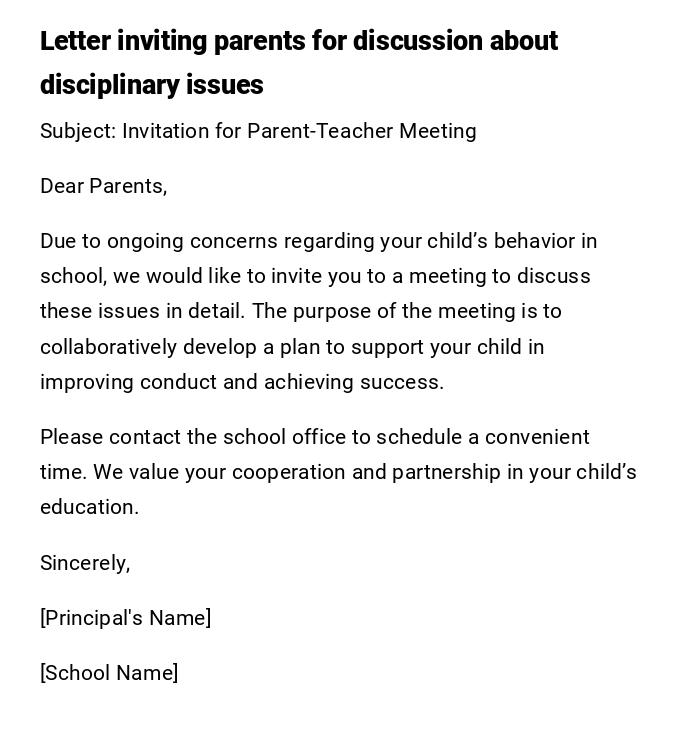
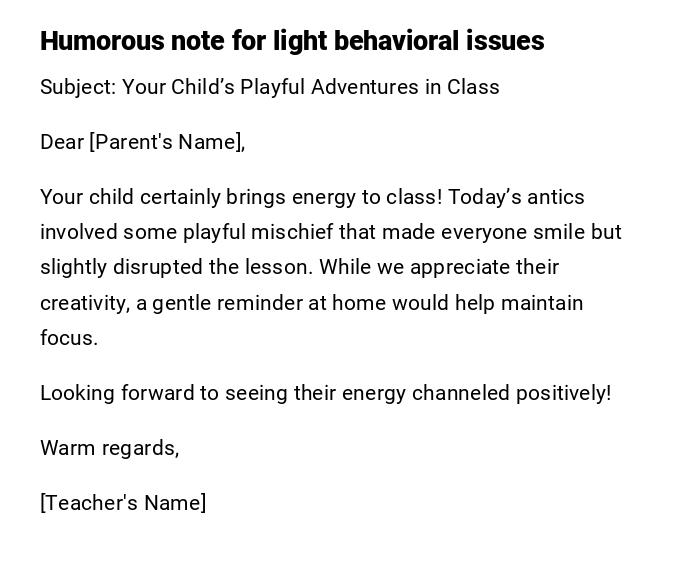

 Download Word Doc
Download Word Doc
 Download PDF
Download PDF